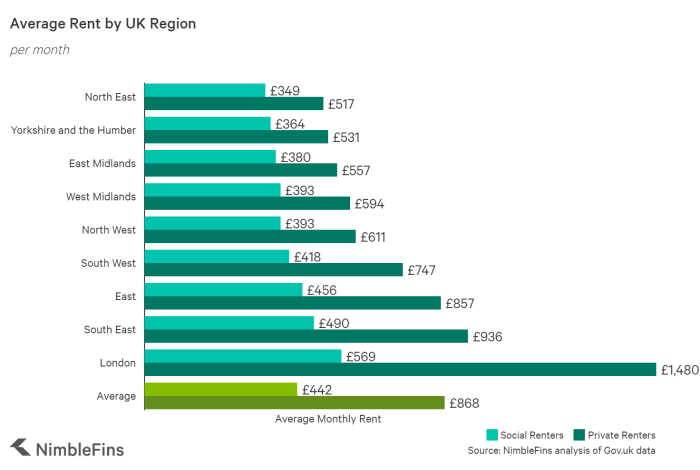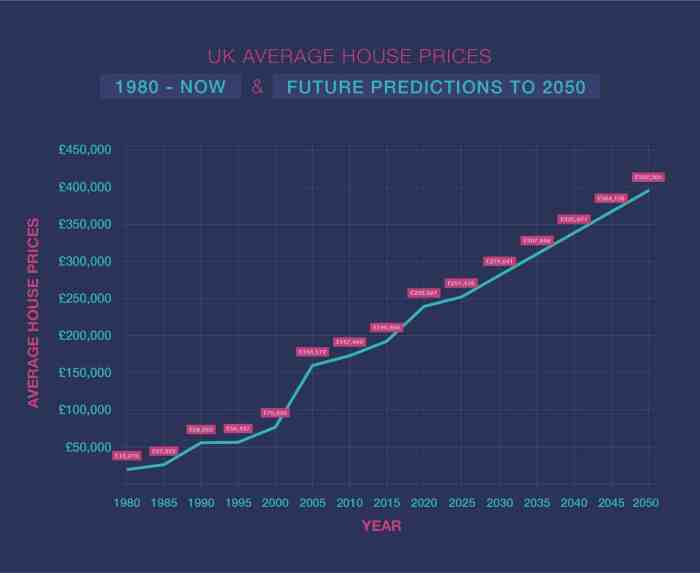House Rent in UK A Comprehensive Guide
Average House Rent Costs in the UK
House rent in uk – Understanding UK house rental costs is crucial for anyone considering relocating or renting a property. Rental prices vary significantly across the country, influenced by numerous factors including location, property type, and market demand. This section provides a comprehensive overview of average rental costs, influencing factors, and typical costs for different property types.
Average Rental Costs Across Major UK Cities
The following table presents average monthly rental costs for different property types in selected major UK cities. These figures are estimates and can vary depending on specific location, property condition, and market fluctuations.
| City | One-Bedroom Flat | Three-Bedroom House | Studio Apartment |
|---|---|---|---|
| London | £1,800-£2,500 | £3,500-£5,000+ | £1,200-£1,800 |
| Manchester | £1,000-£1,500 | £1,800-£2,500 | £700-£1,000 |
| Birmingham | £900-£1,300 | £1,500-£2,200 | £600-£900 |
| Edinburgh | £1,200-£1,700 | £2,000-£3,000 | £800-£1,200 |
| Glasgow | £800-£1,200 | £1,300-£1,800 | £600-£800 |
Factors Influencing Rental Price Variations
Rental price variations across the UK are influenced by a complex interplay of factors. These include geographical location, property type and features, and market demand.
- Geographical Location: London consistently commands the highest rental prices due to high demand and limited housing supply. Coastal areas and towns with desirable amenities also tend to have higher rental costs.
- Property Type and Features: Larger properties with more bedrooms, bathrooms, and desirable features like gardens or parking typically command higher rents.
- Market Demand: Areas with high demand and low supply will naturally see higher rental prices. This is often the case in popular city centres and areas with good transport links.
Typical Rental Costs for Different Property Types
Rental costs vary considerably depending on the type of property. Flats are generally more affordable than houses, while studios offer the most compact and budget-friendly option. Location significantly impacts these costs, as detailed above.
Factors Affecting UK House Rent Prices
Several key factors significantly influence UK house rent prices. Understanding these factors is crucial for both landlords and tenants in navigating the rental market effectively.
Impact of Property Location

Source: cloudinary.com
Location is arguably the most significant factor affecting rental costs. Properties near transport links, desirable amenities (such as parks, shops, and restaurants), and highly-rated schools tend to command higher rents due to increased demand.
Influence of Property Size and Features
The size and features of a property directly impact its rental value. Larger properties with more bedrooms and bathrooms, along with desirable features like a garden, parking space, or modern appliances, generally attract higher rental prices.
Urban vs. Rural Rental Prices
Urban areas typically have higher rental costs than rural areas due to higher demand and limited housing supply. However, some desirable rural locations with attractive scenery or proximity to major cities can also have relatively high rental prices.
Market Demand’s Effect on Rental Rates
Market demand plays a crucial role in determining rental rates. In areas with high demand and low supply, such as popular city centres or university towns, rental prices tend to be higher. Conversely, areas with lower demand may experience lower rental rates.
Rental Agreements and Tenant Rights
Understanding UK rental agreements and tenant rights is essential for both landlords and tenants. This section Artikels key clauses in rental agreements, the rights and responsibilities of each party, and dispute resolution processes.
Common Clauses in UK Rental Agreements
Standard UK rental agreements typically include clauses covering various aspects of the tenancy. It’s crucial to carefully review these clauses before signing any agreement.
- Term of the tenancy: The length of the rental agreement.
- Rent amount and payment schedule: The agreed-upon rent and payment frequency.
- Deposit: The amount of security deposit required.
- Break clause: Conditions under which the tenancy can be terminated early.
- Repair and maintenance responsibilities: Responsibilities of the landlord and tenant regarding repairs and maintenance.
- Notice period: The required notice period for termination of the tenancy.
Rights and Responsibilities of Landlords and Tenants

Source: co.uk
UK law Artikels specific rights and responsibilities for both landlords and tenants. Landlords are responsible for maintaining the property’s habitability, while tenants have a duty to pay rent on time and respect the property.
Resolving Disputes Between Landlords and Tenants
Disputes between landlords and tenants can be resolved through various methods, including mediation, arbitration, or legal action. Seeking advice from a tenant’s rights organization or a solicitor can be helpful in resolving disputes.
Step-by-Step Guide for Tenants Understanding Their Rights
Tenants can access information about their rights through government websites, tenant’s rights organizations, and legal professionals. Understanding your rights ensures a smooth and fair tenancy.
Finding Rental Properties in the UK
Finding suitable rental property in the UK involves utilizing online resources, conducting thorough searches, and following essential steps to secure a tenancy agreement.
Finding Rental Properties Online
Numerous online platforms facilitate the search for rental properties. Popular websites and apps include Rightmove, Zoopla, SpareRoom, and OpenRent.
Checklist for Prospective Tenants, House rent in uk
Prospective tenants should follow a structured approach when searching for rental properties. This checklist ensures a smooth and efficient process.
- Define your budget and property requirements.
- Search online property portals.
- View properties and check references.
- Negotiate rental terms and sign the tenancy agreement.
Importance of Viewing Properties
Viewing properties before signing a tenancy agreement is crucial. It allows prospective tenants to assess the property’s condition, location, and suitability for their needs.
Tips for Negotiating Rental Prices and Terms
Negotiating rental prices and terms can be beneficial. Researching comparable properties and presenting a strong case can improve your chances of securing a favourable agreement.
Illustrative Examples of Rental Properties

Source: reloadvisor-expats.com
The UK offers a diverse range of rental properties, catering to various budgets and preferences. The following examples illustrate the variety available.
| Property Type | Location | Estimated Monthly Rent | Description |
|---|---|---|---|
| One-Bedroom Flat | London Zone 2 | £1,600 | Modern flat with open-plan living area, well-equipped kitchen, and a balcony. Close to public transport. |
| Three-Bedroom House | Rural Cotswolds | £1,800 | Charming period house with a garden, located in a quiet village. Offers ample space and countryside views. |
| Studio Apartment | Manchester City Centre | £900 | Compact studio apartment with integrated kitchen and bathroom. Ideally located near the city centre and transport links. |
The Impact of Economic Factors on House Rent: House Rent In Uk
Economic factors significantly influence UK house rental prices. Understanding these factors helps predict future trends and navigate the rental market effectively.
Inflation and Interest Rates’ Influence
Inflation directly impacts rental costs, as landlords often adjust rents to reflect rising prices. Interest rate changes influence mortgage costs for landlords, potentially impacting rental prices.
Government Policies and Regulations
Government policies and regulations, such as rent control measures or tax incentives for landlords, can significantly influence rental market dynamics. For example, stricter regulations on evictions could lead to increased stability but may also reduce the supply of rental properties.
Comparison to Other European Countries
Comparing UK rental market trends with other European countries reveals variations influenced by local economic conditions, regulations, and cultural factors. For example, rent control policies in some European countries differ significantly from the UK’s approach.
Potential Future Trends
Predicting future trends requires considering various factors. Continued population growth, limited housing supply, and potential economic shifts could influence rental prices. For instance, an economic downturn might lead to a decrease in demand and rental prices, while a period of strong economic growth might drive them up.
FAQs
What is a deposit and how much should I expect to pay?
A deposit is a sum of money paid upfront to secure a rental property. It typically ranges from four to six weeks’ rent, held by a government-approved scheme to protect tenants.
What are my options if my landlord fails to maintain the property?
If your landlord fails to maintain the property to a habitable standard, you can contact your local council or housing authority. You may also be able to withhold rent (with caution and legal advice).
How long are tenancy agreements typically for?
Tenancy agreements are usually for six or twelve months, although shorter or longer terms are possible. Always review the terms carefully before signing.
Can I break my tenancy agreement early?
You can usually break a tenancy agreement early, but you may be liable for the remaining rent unless you can find a suitable replacement tenant. Your lease will Artikel the specific conditions.




















